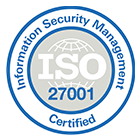Digital Transformation
Unlock success with digital transformations
Digital transformation is the process of using digital technologies to fundamentally change the way organizations operate, deliver value to customers, and engage with stakeholders. It involves a shift from traditional, analog systems to digital systems that leverage data, automation, and advanced analytics to optimize processes, enhance decision-making, and create new business models.
Digital transformation involves the integration of technology across all aspects of an organization’s operations, including its people, processes, and technology. This may involve the adoption of cloud-based systems, the use of big data and artificial intelligence (AI) to analyze data and gain insights, and the development of new digital products and services.
The benefits of digital transformation can be significant. By adopting digital technologies, organizations can improve efficiency, increase productivity, and reduce costs. They can also enhance customer experiences, drive innovation, and gain a competitive advantage in their industries.
However, digital transformation can also be challenging, as it often requires significant changes to an organization’s culture, processes, and workforce. It requires strong leadership, collaboration, and a commitment to ongoing learning and development.
Overall, digital transformation is a critical component of staying relevant and competitive in today’s rapidly changing digital landscape. Organizations that successfully navigate the digital transformation journey can position themselves for growth and success in the years to come.


Digital transformations tend to be wide in scope. Organizational change efforts involve multiple functions, business units, or the entire enterprise. Additionally, the adoption of technologies plays an important role across digital transformations. The key factors to success are:
- Having the right, digital-savvy leaders in place
- Building capabilities for the workforce of the future
- Empowering people to work in new ways
- Giving day-to-day tools a digital upgrade
- Communicating frequently via traditional and digital methods
Become a Cognitive Digital Enterprise
RTS helps growth-oriented organizations become Cognitive Digital Enterprises that deliver value with competitive differentiation enabled by agility, customer centricity, and actionable insights.

To be successful, organizations must develop new operating models enabled by key technologies that:
Transcendent Customer Experience
Give customers and employees what they need by making technology feel more human!!!!
- Enable rich do-it-yourself experiences backed by human expertise
- Recognize mobile devices as the primary channel for interaction
- Leverage analytics and orchestration for a frictionless experience
Automation Everywhere
Embrace hyper automation, operations automation, and enterprise service management to drive highly automated business processes. In a Cognitive Digital Enterprise, automation is a complementary business function that works with – not in place of – humans. By using automation, organizations can:
- Execute faster with fewer errors
- Free up employees from mundane tasks
- Lower costs and create more efficiency
- Improve customer interaction
Enterprise DevOps
Drive continuous improvement by implementing principles of DevOps into surrounding processes, including release planning, change management, and production operations to:
- Drive business agility
- Optimize for rapid continuous delivery of applications and services
- Embrace cultural + behavioural change to create an environment for success
Data-Driven Business
Create value from and monetize assets by adopting a data mindset and supporting a systematic approach to data strategy, architecture, operations, and execution. A data-centric mindset will allow businesses to:
- Extract data from internet of things (IoT), social media, and customer engagement systems
- Employ artificial intelligence (AI) and machine learning (ML) to optimize, improve, guide, and execute actions
- Monetize data assets with high-value business use cases
Adaptive Cybersecurity
Develop security functions that can automatically sense, detect, and respond to access requests, authentication needs, threats from within and outside, and meet regulatory compliance.
To accomplish this, RTS helps organizations:
- Combine AI-enabled solutions with a crowdsourcing environment to detect threats
- Employ DevSecOps to bridge the gap between development, security, and operations teams
- Adopt mature access and authentication practices within a Zero Trust framework



